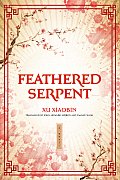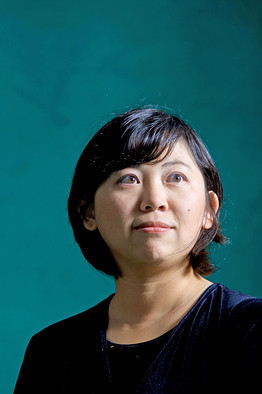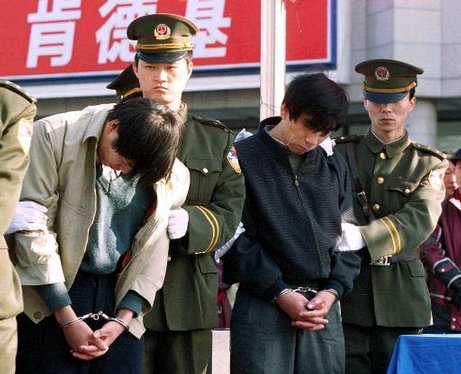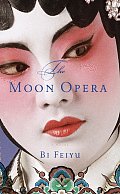Foreign Items, Quality Various
| The VagrantsBy Yiyun LiRandom House, 2009Feathered SerpentBy Xu XiaobinAtria Books International, 2009The Moon OperaBy Bi FeiyuHoughton Mifflin Harcourt, 2009 |  |
 |
For a healthy, old-fashioned humbling, take out a sheet of paper and write down everything you know about China. Now cross out any of your answers relating to Yao Ming, Andy Warhol silkscreens, pandas, or small girls who aren’t cute enough to be seen singing at the Olympics. If your list has any more substance than Eric Idle’s paean to the Chinese people for Monty Python (“Think of the many things they’ve done to impress / There’s Maoism, Taoism, I-Ching, and chess”) then you are slightly above the curve.Now make a list of important Chinese novelists. All done? It must be one of the tremendous quirks of literature that, despite having incubated over the course of eons a highly refined artistic and intellectual culture, despite nurturing an ancient reverence for written language, and despite working from a foundation formed in part by Cao Xueguin’s Qing dynasty saga The Story of the Stone, over the past 250 years, while its neighbors have produced Tolstoy and Tanizaki, China’s most internationally famous novelist was born in West Virginia and had the name Pearl Comfort Sydenstricker Buck.Or perhaps this isn’t a quirk as much as a testimony to the almost insuperable cultural barriers erected by Emperors and Great Leaders over the past 2,500 years, barriers so strong that they all but checked the tsunamis heaved up after Plato, Aristotle, the Levitical Priests, Jesus, and Mohammed, to say nothing of Charles Dickens or Harriet Beecher Stowe. But, as today’s Chinese government has come to understand as well as anybody, isolationism will never again be an enforceable political position unless it should one day become planetary; and the most powerful potentate is a mere Wikipedia stub within the kingdom of the Internet.The expanded avenues of connection, both online and in flight paths, guarantee a freer exchange of literature. China has 1.3 billion people and over 3,000 years of recorded civilization, so it won’t be long before it’s pouring out as much as it’s taking in. But what’s going to rush from the breaches in those antediluvian walls remains an open question. How are books presently viewed by China’s authoritarian government, and how intrusive are its censors? Are Li Po and Cao Xueguin taught in schools, or is a young bookworm’s likeliest source for writing The International Herald Tribune? I don’t know, but a sign that to Chinese officials writing is still more reluctantly tolerated than encouraged is that the country’s most audible voices are bloggers and expatriates.Yiyun Li is one such expat – she lives in California and writes in English – and has recently published her first novel The Vagrants to a healthy share of critical notice. The Vagrants isn’t samizdat literature, but it almost certainly would not have been allowed publication in China. Such a fact must have been at the front of Li’s mind as she wrote this book – a prosecution as much as a novel – and it’s consequently laden with a grim sense of moral disapproval that it wears as uncomfortably as a damp overcoat.
| The Vagrants is about a political execution held in 1978 in a small village called Muddy River, the quiet but courageous protests that are staged in its aftermath, and, finally, the swift reprisals that fall on the heads of anyone thought to support the protestors. There’s a neat and terrible continuity to this novel because it’s bookended by the political executions of women (you leave The Vagrants with the feeling that this spectacle would be repeated regularly if the book were to go on, like a kind of grotesque Sabbath ritual), but it’s mostly concerned with the shadowed space surrounding the executions and the way of life of the average inhabitant of Muddy River living under the cloud-cover of Communist repression. The novel moves panoptically among a wide cast of characters with varying opinions of and connections to the awful central events: there’s Teacher Gu, the embittered father of the woman who is first executed for her counterrevolutionary sentiments; Kai is the privileged news reporter who nevertheless dares to be the high-profile face of the pro-democracy dissent; the Huas are indigent trash collectors who also sometimes salvage and raise abandoned babies; and, curiously, a number of children occupy the remainder of the book and act as our eyes for its most dramatic moments. |  |
Not that there’s very much drama to report. The keynote of Li’s condemnation of the Chinese government appears on the very first page of The Vagrants when Teacher Gu laments that “The date set for his daughter to die was as arbitrary as her crime, determined by the court, of being an unrepentant counterrevolutionary.” Li is invoking Kafkaen dread here – the idea that you can be sentenced for a crime and never precisely know what you did or who has sentenced you – and the requisite bleak introspection that follows such dread determines what scenes we have. At moments Li does a good job of representing the particular bureaucratic cruelty of the Communist regime – Teacher Gu, for instance, is forced to pay for the bullet that will kill his daughter. But The Vagrants is foremost a mood novel, and the dominant mood is torpor. For a majority of these pages the reader lives in close proximity to the unhappy meditations of characters who seem to be doing little more than walking to and fro across Muddy River having unhappy meditations.These beleaguered reflections are often sad, but they’re never inspired – that’s the whole point. Emotionally eroded by poverty and persecution, the characters have the imaginative capacity for little more than flat assessments of their predicaments. As she hides her involvement in the protests from her husband, Kai
smiled and said she was only tired. She had no right to stop a husband from dreaming up a future to share with his wife. She wondered if the foundation of every marriage was made up of deceptions, and whether to keep the marriage from collapsing the deceived party had to maintain a blind confidence or a willingness to look away from the unwelcome truth.
During one of his perambulatory meditations, Teacher Gu draws a conclusion similar in its dejected and defeated tone:
He saw the joy of being able to read, in his wife’s eyes, as well as in the eyes of each new generation of girls; he hoped that he had done his share, even if it was only a little one, to make this place a better one. But now he saw that the messages from those books, full of men and women full of desire to deceive and to seduce, would only lead these girls astray. Even his two best students – his wife and his daughter – had failed him.
There’s nothing more deadly to a novel than a lot of accurate statements, but that’s largely what emerges from the ostensibly diverse yet uniformly whittled inner life of The Vagrants. Significance isn’t achieved by emphasis or contrast but by pounding repetition. The wind of listless disillusion blows across everyone. In the same vein, Li has an unconscious habit of stating exactly what an action or interaction is there to suggest. Even in a moving moment, when a dissident named Jialin who is dying of tuberculosis speaks with painful frankness to his mother, Li can’t avoid the memo-like statement of the obvious. “What else can I leave for you, Mama?” Jialin says. “I can’t give you grandchildren.”
Jialin’s mother left the shack without answering; on the way out, she bumped into the door frame. He listened to her broken sobs disappear into the depths of the house and had to force his heart to remain hard, untouched by his mother’s tears.
It’s a fine little touch, having the grief-stricken mother, blinded by tears, bump into the door-frame while her son refuses to move or comfort her. But the redundant tag “untouched by his mother’s tears” is pinned to the paragraph like a lead weight on the tail of a kite.The children in The Vagrants may seem to offer some change from the hyperconscious melancholy clinging to the adults. But except for a blissfully indoctrinated boy named Tong, these are children that rarely evoke childhood. Nini is a pariah born with a physical deformity who could chair a seminar on agonized brooding. Bashi is a soft-minded (and gratingly loquacious) teenager who seduces Nini with gifts and oddball sweetness. Both are eventually ensnared in the government’s crackdown of the protestors, but mostly Nini and Bashi’s courtship feels strangely disassociated from the rest of the book, seeming almost to belong to an entirely different novel.

Chinese convicts before their public execution
Sometimes, in fact, you can see what that novel might be. The best quality of The Vagrants is Li’s intimate investment in her characters. She grew up in China and has clearly borrowed from her scrapbook of memory to populate Muddy River; there are touching and genuine moments when the force of memory surges into the scenes and briefly animates them:
“Now, now,” said the nanny [to Kai’s son] finally, when Kai failed to pry Ming-Ming’s small fingers off her hand. He screamed in protest when he was pulled out of Kai’s arms, and the nanny caught the small wrist and shook it gently. “Ming-Ming will be a good boy. Wave to Mama and let Mama go to work. Without work Mama doesn’t make money. Without money there is no food. Without food Ming-Ming’s tummy will rumble. And when Ming-Ming’s tummy rumbles Mama will be too sad to go to work.”The girl had a way of talking in circles, her tone flat and unhurried, as if she was telling an old folktale that no longer held any suspense, and Ming-Ming always calmed down. In those moments Kai felt that the girl was innocent and mysterious at once, a child and an old woman sharing the space within her skinny body, neither aware of the other’s existence.
But though these characters are drawn from life, they are rarely permitted to live, and The Vagrants is too often indistinguishable from Ha Jin’s depressing expatriate novel Waiting, which both moralizes about and forces the reader to undergo the gnawing futility of passive endurance. In an irony Li could not have intended, the reader is relieved when the government descends upon Muddy River to dole out its harsh retribution, because the book begins to move at a livelier clip. The resolve and celerity of the reprisals command a kind of respect, if only because they bring some excitement to the proceedings. Li would have us know that the punishments are deplorably arbitrary – and they are, but we also know, although Li never appears to recognize, that from the government’s perspective the perceived arbitrariness is an irrelevant feature of their fear-inducing severity. This was a highly effective, highly efficient, extremely brutal authoritarian government – yet it’s portrayed in this book as a vague, almost existential menace. The Vagrants tries tentatively to reveal both the everyday existence of small-town Chinese in the late 1970s and the inhuman and corrupt practices of the government at the time, but it falls between the two stools in the attempt. It is an honorable, serious, tedious novel that says things that everyone will agree with in such a way that no one will quite be able to care.The back of Xu Xiaobin’s newly translated novel Feathered Serpent contains a laudatory blurb from Contemporary Literature Scene magazine, rather neatly answering any lingering doubts you might have about whether China has a contemporary literature scene. This is an embattled scene, to be sure, that has to contend with censors on one side and pirating on the other – yet since its publication in 1998, Feathered Serpent has sold hundreds of thousands of copies. It is now the first title in Atria’s line of International Editions. And it is also, unhappily, one of the more inane books I’ve ever read.It tells the story of Yushe and her Odyssean quest for love and acceptance. She is born an unwanted child in an old-fashioned and superstitious household run by her termagant mother and grandmother, and their fairly inexplicable contempt for Yushe simply foreshadows the many times that she will have her heart “smashed to smithereens” (as on page 24) or “burnt like a branding iron” (as on page 26, her heart having apparently been reconstituted from its smithereen state). Early in Feathered Serpent, Yushe jealously smothers her infant brother, and it’s a sign of the novel’s telenovela ethos that we’re supposed to feel sorry for the wayward girl and sustain an interest in her histrionic life.But nearly everything about this book displays the affectations of an ingénue who thinks she’s the first person to ever write a novel. The scenes shift confusingly in time, as does the form of narration, as indeed does the verb tense within each scene (a single paragraph will switch from the present to the past tense for no clear reason except precocity). And Xiaobin is painfully prone to delivering oracular pronouncements: “Nearly all beautiful women live ill-fated lives” is the typical fortune-cookie fodder, but sometimes the shared wisdom is priceless, so to speak, as when Xiaobin solemnly explains, “Money is important in a commercial society.”Nor is the reader of Feathered Serpent given any succor by its translators, John Howard-Gibbon and Joanne Wang, whose version manages to be both wooden and filled with mishandled colloquialisms (they call Yushe’s mother and grandmother “gals,” for example). A single paragraph should convey the direness of the situation:
That evening Xuanming [Yushe’s grandmother] shed tears. It seemed as if she suddenly thought that aside from all the romantic antics of Qin Heshou and his actresses, there were countless other shenanigans going on without cease in this world. Her son and daughter were no longer babies. Their eyes could already read the world around them; their ears understood the quarrels of adults. This was a terribly dangerous, frightening, and also woeful situation!
Yushe’s wanderings are to some extent used as a vehicle to comment on the tumultuous history of Communist China – she walks by protestors in Tiananmen Square, for instance, and is struck by their beauty and passion – and Xiaobin’s trick seems to have been to smuggle some amount of political criticism past the censors in the baggage of a soap opera. Americans looking for that, though, may as well stick to the extensive work of gloomy Chinese expats.
| Bu Feiyu’s The Moon Opera, about an aging singer attempting to take to the stage after twenty years of silence, has nothing to do with counterrevolutionary activity and so need not worry about censorship – the result is an intelligent and crafty little novel. Feiyu has screenwriting listed on his CV, and The Moon Opera reads like a series of well-staged scenes, so that in spite of its miniature size (it’s 117 pages long) it contains a living model of the striking world of the Peking opera. Feathered Serpent is a diva’s take on a serious subject; The Moon Opera is a serious writer’s take on a diva. |  |
Each chapter concentrates on the confrontation of two or more players in the revived production. First, the arrogant theater producer meets his match at a dinner with an even more arrogant factory owner who will become his patron. Then the producer must find out whether his putative star Xiao Yanqui still has the chops to perform the demanding role of Chang’e:
Yanqui sang straight through for fifteen minutes. When she finished, Bingzhang [the producer] opened his eyes and squinted to size up the woman before him. The Erhuang piece she’d just sung had gone from slow to meandering to a lyrical rhythm, and then to a strong beat, leading to a crescendo, a complex and demanding melody that required a broad vocal range. She had been away from the stage for twenty years, yet sang it beautifully, without missing a note; clearly, she had never stopped practicing. Bingzhang sat sprawled in his chair, not moving yet deeply moved. Twenty years, he sighed to himself, it’s been twenty years. A tangle of emotions filled his heart. “How did you manage to keep at it?”“Keep at what?” she asked him. “What is it I’m supposed to have kept at?”“It’s been twenty years. It couldn’t have been easy.”“I didn’t keep at anything.” Finally grasping what he was getting at, she looked up and said, “I am Chang’e.”
(The excerpt should also give an idea of the professional work Feiyu gets from his translator duo, Howard Goldblatt and Sylvia Li-chun Lin.)Xiao Yanqui naturally becomes the high-strung star of the book, and must whip her middle-aged body into shape, satisfy the advances of the boorish factory owner, and cope with a power play from her beautiful young understudy. This is, as I say, a slight book, but it wends the magic of a strange and ancient art form through the grubbier realities of modern-day patronage and performance. China’s literary scene, of which we currently know so little, is bound to become increasingly transparent to those of us in the West – more translations of Feiyu’s books might be a fine introduction to the unaccustomed world of letters that we’ll discover.___Sam Sacks has written books reviews for Pittsburgh Pulp, The Tucson Weekly, The New York Press, The Las Vegas Weekly, Columbia Journal of American Studies, freezerbox.com, and thefanzine.com. He lives in New York City.Return to the Main Page